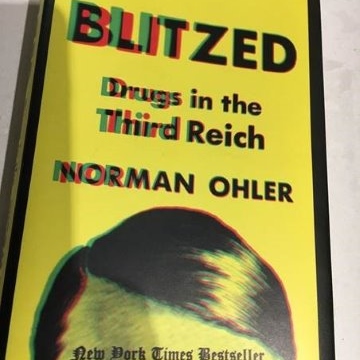
Voices

Third Reich abused drugs to help them fight the war
VIC ALHADEFF
The largest motorised unit in military history had assembled, comprising 41 410 vehicles and including 1 222 tanks. Its goal – to reach the French town of Sedan before the French Army did. But only by fighting non-stop for at least 72 hours would that be physically possible.
Noted General Franz Halder in his diary: “We have to resort to unusual means.” That meant one thing – drugs. Specifically, methamphetamine.
A supply of 20 000 pills was distributed to the soldiers, who collectively consumed the entire stock during the night of May 10 – 11, 1940.
“Twenty minutes later, the nerve cells in their brains started releasing neurotransmitters,” writes German author Norman Ohler. “All of a sudden, dopamine and noradrenaline put the soldiers in a state of absolute alertness. The night brightened, no one would sleep, lights were turned on and the Wehrmacht started eating its way tirelessly towards Belgium.
“The listlessness and frustration of the first few hours made way for new and strange feelings. Something started happening, something no one could readily explain. An intense chill crept across scalps, a hot feeling of cold filled everyone from within. There were as yet no storms of steel, as in the First World War, but instead a storm of chemicals broke out, punctuated by euphoric flashes of mental lightning.
“The level of activity reached its peak. The drivers drove; the radio operators’ decoding machines, like futuristic typewriters, radioed; gunners in black combat trousers and dark grey shirts crouched behind their weapons, ready to fire.
“There were no more breaks; an uninterrupted chemical bombardment had broken out in the cerebrum, the body released greater quantities of nutrients, boosting its sugar production so that the machine was running at maximum output and the pistons were going up and down exponentially. The average blood pressure increased by up to 25 per cent and hearts thundered in the cylinder chamber of the chest.”
Ohler featured at a recent Sydney Writers Festival to discuss Blitzed: Drugs in the Third Reich, his hitherto-untold account of the astonishing reliance on drugs within the Third Reich – all the way to the Nazi high command and Hitler himself.
Endorsed by British historian Ian Kershaw, who wrote Hitler: A Biography, Ohler shed light on the extraordinary drug-taking within the German army – untold millions of pills – and their role in enabling soldiers to stave off sleep for as long as 17 days and thereby to catch Allied forces off-guard in key battles.
“We felt a kind of high, an exceptional state,” related a German soldier, whose unit had fought without a break for three days. “We were sitting in our vehicles, covered in dust, exhausted, wired.”
Methamphetamine reportedly became an indispensable component of numerous German battle plans, one tank group consuming 30 million pills within months, the mental high and military victories giving troops a sense of arrogance, fearlessness and uninhibited invincibility.
Of course, there were consequences – cardiac arrests, heart attacks, physical collapse.
German pilots also usedutilised the drug, enabling their Messerschmitts to keep flying for longer than Britain’s Spitfires, as did the navy, with Hitler Youth recruited to pilot one-man torpedo vehicles while ingesting cocaine-spiked chewing-gum. Many drowned at sea.
Drugs were also used as a form of torture, with cocaine administered to Sachsenhausen inmates to test how long they could keep walking, some managing four days non-stop.
As for Hitler, he became increasingly dependent on drugs, Dr Theodor Morell administering 28 pills a day at one stage, in addition to a barrage of injections, scarring his patient’s arms where the skin was perforated.
As the pressure of losing the war mounted, Hitler’s physical decline belied his unrealistic drug-imbued optimism and he began experiencing tremors, regularly placing his right hand over his left and right leg over his left to conceal the shaking when seated.
Having spent five years researching the book, the author is at pains to emphasise that Hitler’s “goals and motives were not the result of drugs, but established much earlier. Hitler did not murder because he was living in a haze,” he stresses; “quite the contrary, he remained sane until the end. Hitler was always the master of his senses and knew exactly what he was doing.
“He acted always in an alert, cold-blooded way. He acted systematically and with terrible consistency to the end. He was anything but insane. He could go on taking as many drugs as he liked to keep himself in a state in which he could commit his crimes. It does not diminish his monstrous guilt.”
Vic Alhadeff is chief executive of the NSW Jewish Board of Deputies in Sydney, Australia. Twitter: @VicAlhadeff




